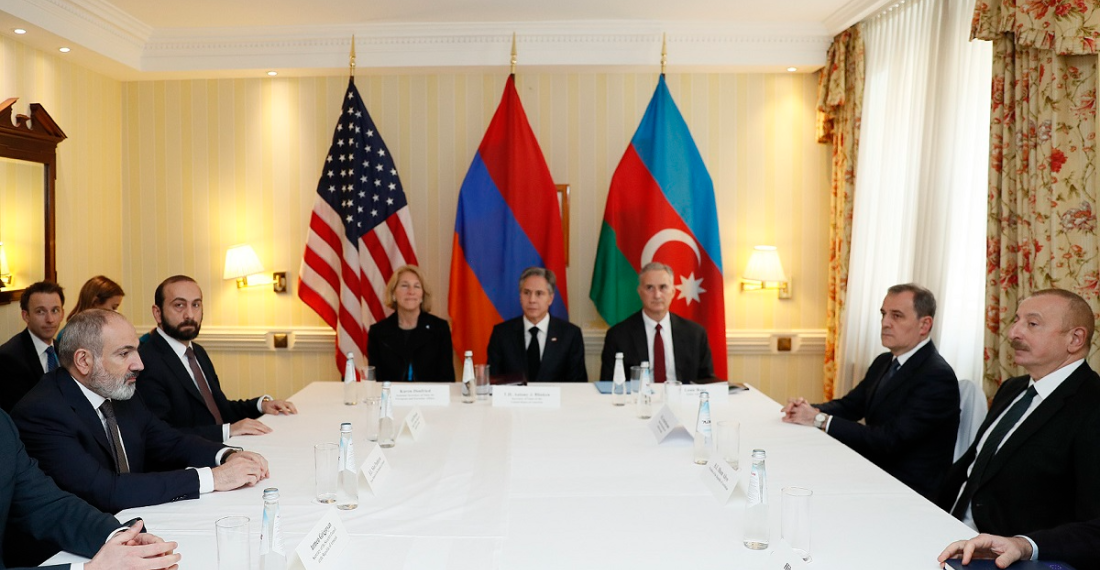"Reports from various sources say both Armenia and Azerbaijan are concentrating their troops along the border zone, in an apparent preparation for a potential escalation," writes Vasif Huseynov in this op-ed for commonspace.eu. Despite the optimism following last month's Munich meeting between the leaders of the two countries, the sides have not since taken any tangible step towards the resolution of their ongoing disputes. This despite the fact that "recent history of the Armenia-Azerbaijan conflict is a testimony to the fact that an unstable status-quo, with imitations of negotiations, is a ticking bomb", he argues.
For many local and international observers, the Munich meetings of Armenian and Azerbaijani leaders in February constituted a breakthrough in the peace negotiations between the two countries which had stalled for a number of months. Developments in their relations since then, on the contrary, demonstrate that these optimistic observations were premature as the sides have not since taken any tangible step towards the resolution of their ongoing disputes, including the Lachin standoff. In parallel, there are reports from various sources that both sides are concentrating their troops along the border zone, in an apparent preparation for a potential escalation.
“Now the possibility of escalation along the border of Armenia and Nagorno-Karabakh is very high”, said Prime Minister Nikol Pashinyan on 14 March, referring to “increasingly aggressive rhetoric of Azerbaijan” as evidence and denying Armenia’s role in renewed tensions. Armenia has taken actions to “prove that we are not to blame for the escalation”, he said adding that “We have solved that problem along the border [by deploying the EU monitoring mission]. That mechanism exists in Nagorno-Karabakh as well… It’s about the Russian peacekeeping forces”.
This approach of the Armenian government is fraught with many contradictions, and contributes a lot to the existing tensions.
The Armenian government is trying to freeze the existing status-quo
First and foremost, the Armenian premier demonstrates the strong interest of his government in freezing the existing status-quo. He thinks that his government can prolong the peace negotiations indefinitely and Azerbaijan should just accept it. A series of meetings mediated by both Russia and the Western powers, and the agreements reached, failed to provide any tangible outcome. Even after the Prague summit on 6 October 2022, when Armenia and Azerbaijan recognized each other's territorial integrity, officials of the Armenian government subsequently denied that they recognized Karabakh as part of Azerbaijan.
Armenia has also refused to proceed with the re-opening of the transportation routes. While Azerbaijan soon plans to finish the construction works on its section of railways and highways that would connect the western part of mainland Azerbaijan with the Nakhchivan exclave, Armenia has yet to start building its part.
Thus, Yerevan wants to freeze this status-quo by imitating negotiations and seemingly hopes for a better geopolitical situation that might appear in the future and strengthen Armenia’s bargaining power.
Secondly, as the Azerbaijani side warned from the beginning, the deployment of the EU monitoring mission in Armenia is used by Yerevan as a protection shield whilst it refuses to meaningfully engage with the peace process. The Armenian premier does not deny this fact and clearly says that his government “has solved that problem”.
This encourages Pashinyan to avoid implementing the commitments his government has undertaken in the trilateral statement of 10 November 2020 and in the subsequent documents signed by his government. The lack of any pressure by the EU on Yerevan to recognize the Karabakh region as part of Azerbaijan, and implement the commitments the Armenian government has undertaken, further increases Pashinyan’s confidence.
The status-quo is not sustainable
This tactical approach of the present Armenian government is strikingly similar to what the former Armenian leaders, as well as Pashinyan himself, maintained in the peace negotiations prior to the Second Karabakh War. For up to thirty years, they sought to prolong the negotiations and implement creeping annexation of the occupied Azerbaijani territories. This is all clear how these policies ended up with dramatic consequences for the peace and security of the region with thousands of victims on both sides. It is therefore very worrying that Yerevan replays these tactics and narratives.
Azerbaijan has legitimate concerns about the present situation in the Karabakh region and along the state border with Armenia. This month, the Ministry of Defense of Azerbaijan provided proofs of the transfer of military personnel and equipment from Armenia to the Karabakh region escorted by Russian peacekeepers. This, coupled with Armenia’s refusal to withdraw its armed forces from the Azerbaijani territories, even though they promised in July 2022 to pull them out by September of that year, shows that the Armenian side tries to reinforce its military position in the Azerbaijani territory, and is preparing for an escalation. Baku has earlier observed the deployment of Iranian fighters to the Karabakh region, and the supply without any charge of arms by Iran to Armenia.
This situation is rather dangerous and can indeed explode into a violent flare-up. The recipe for its prevention is, however, well known. Armenia and Azerbaijan should return to the EU-mediated peace talks, and Yerevan needs to honor its commitments by recognizing Karabakh as part of Azerbaijan and sign a peace treaty that includes this clause. Recent history of the Armenia-Azerbaijan conflict is a testimony to the fact that unstable status-quo with imitations of negotiations is indeed a ticking bomb.
source: This op-ed was prepared for commonspace.eu by Dr Vasif Huseynov, Head of Department at the Centre of Analysis of International Relations (AIR Centre) and Adjunct Lecturer at Khazar University in Baku, Azerbaijan.
photo: Armenian and Azerbaijani leaders met in Munich in February 2023 thanks to US mediation (archive picture)
The views expressed in opinion pieces and commentaries do not necessarily reflect the position of commonspace.eu or its partners







